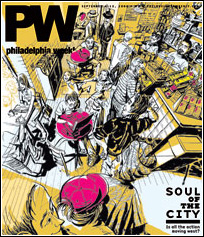Factories' Friend.
State programs subsidize manufacturers' skill search.
From the November 7, 2008 Philadelphia Business Journal.
In a Port Richmond factory the size of three football fields, the PTR Baler and Compactor Company produces 3,000 balers and 1,500 compactors per year.
They are the largest manufacturer of vertical balers in the world, helping to recycle thousands of tons of cardboard annually. They control about 40 percent of the baler market in the United States with their machines being used at Wal-Marts, Pathmarks, Shop Rites and Targets across the country.
The 101-year old company employs around 200 people, most with middle class wages and excellent union benefits.
And yet, PTR often has trouble filling positions in the plant.
"Trying to find qualified, skilled welders has been really tough," said Gary Fudala, PTR's vice president of operations.
The skilled workforce in the region is very thin. Training new employees costs PTR around $10,000 per person, so taking a chance on an unskilled laborer wasn't a great alternative.
Then in 2004, Fudala discovered the Customized Job Training (CJT) program offered by the Philadelphia Workforce Development Corporation. The Workforce Development Corporation pays half the cost of training people - up to $3,500 per individual - in skills needed for manufacturing companies.
"When they give us $3,500, that really helps," Fudala said. "You're talking about 1/3 of the cost for me to train a guy."
Based upon a personalized curriculum developed by Fudala and implemented by CJT instructors, about 65 people - who were previously unskilled - were taught welding and given jobs at PTR over the last four years.
"We take someone who is a raw material, a person with no marketable skills, and we turn them into a craftsman," said Fudala, a 35-year employee of PTR. "They'll have that for the rest of their lives. They'll be able to make a good living forever."
Around 350 people have been trained for 20 different manufacturers since CJT was established in 2004.
And CJT is just one of several state-government sponsored initiatives that provide funding to make industrial training affordable, like WEDnetPA and a new program called Industry Partnerships. Participating companies develop workers tailored to the company's needs and individuals become employable.
Eric Nelson, the executive vice president of the Philadelphia Workforce Investment Board which is working with Industry Partnership, said, "Manufacturing has historically been an industry where a person could - through advancements and rise in seniority - buy a home, help their kids go to college and have a little piece of the American dream."
In 1970, there were around 250,000 manufacturing jobs in Philadelphia.
Since then, however, many local companies shuttered, either going out of business or moving operations overseas. In recent years, many manufacturing jobs have been eliminated as workers have been replaced by machines.
Now, there are around 40,000 people working in industry in the city.
As jobs disappeared, interest in the manufacturing jobs waned. Now, the region faces a dilemma - the existing skilled workforce is approaching retirement age in large waves and there are few skilled workers to take their jobs.
"We recognize the need to act now in terms of being responsive, proactive to the number of people who will retire in that industry over the next five to ten years," Nelson said. "We're in a good position to train new hires or attract new people to the industry so there won't be any impact."
Industry Partnerships will begin training programs in January.
According to Steve Jurash, the president and CEO of Urban Industry Initiative and the Manufacturing Alliance of Philadelphia, there are more than 800 manufacturing jobs in the city of Philadelphia right now that can't be filled because of a lack of skilled labor in the region.
"There has been a horrible disconnect for manufacturing," Jurash said. "Because people generally thought manufacturing was dead, they didn't take the time to invest in the programs to make those skills available."
A first year welder in Philadelphia earns around $19 per hour, Jurash reports, and the average manufacturing job in the city pays about $47,000 per year. He criticizes the government for not fighting harder to preserve manufacturing jobs.
"Philadelphia has one of the highest unemployment rates in the country," he said. "Yet we have manufacturers here who pay great wages and they're dying to find good employees. What's wrong with this picture?"
Without government support, industrial training historically fell into the hands of colleges and trade schools. But many of the unemployed couldn't afford education on their own. Convincing those in college to enter the blue-collar world has its own challenges.
"It's a difficult pitch based on the stigma attached with working for a manufacturer," said Tim Smith, the manager of business services at the Workforce Development Corporation. "Everyone thinks it's really a dirty job. But manufacturing jobs have changed over the years. It's more computer generated. Working in these manufacturing plants these days requires a lot of skill."
Fudala of PTR Baler and Compactor is taking advantage of government subsidies to train his employees in blueprint reading. He currently has 18 employees taking night classes at Edison High School after working their shifts at the plant. He has also used the employment programs to teach potential employees English as a second language. Some of his employees earned their GEDs through state funding.
"The real value is that it makes you willing to hire an unskilled laborer, a person who doesn't have any skills and otherwise couldn't find a job," Fudala said. "It allows you to invest that money in them. The truth is it makes me feel very proud, to be quite honest with you."
Founded in 1907 as the Philadelphia Tram Rail Company, builders of railcars for livestock, PTR has been growing annually in recent years. They hired 25 people in 2008 alone. The company now ships their balers and compactors around the world including to England, Saudi Arabia, Germany and Mexico.
"People think manufacturing is dead," Fudala said. "Take my word for it, it is not. It is alive and well."
His only real concern is that more of the other 1,300 manufacturing companies in Philadelphia aren't taking advantage of these government-funding initiatives.
"There are just so many of these organizations out there," said Fudala. "It took years for me to learn all of the places and names. There are so many companies that don't realize the organizations are out there and could help them. It's really a shame."








